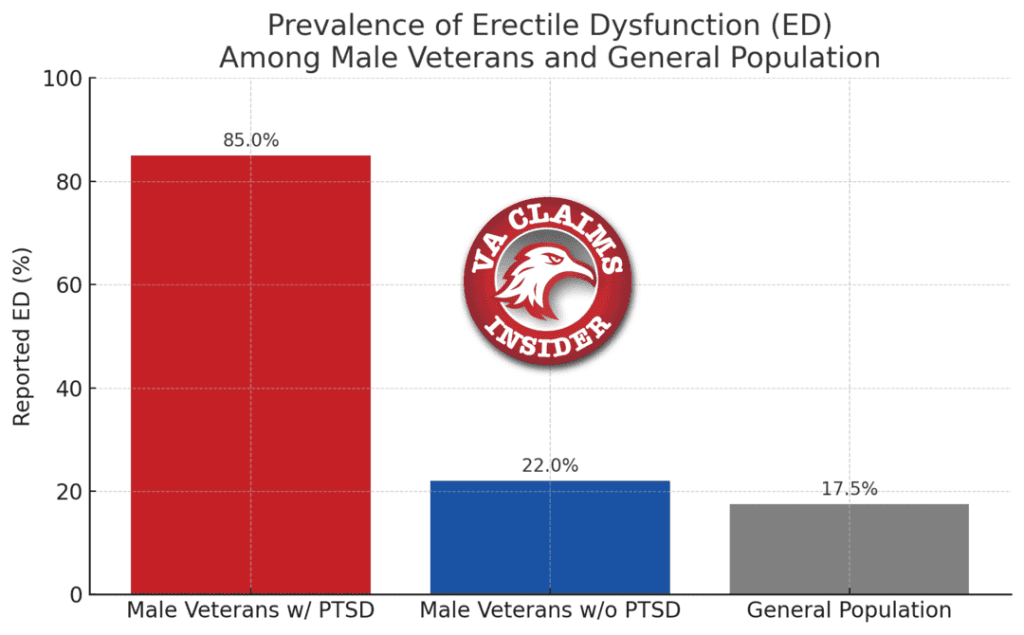Looking for Expert-Level VA Claim Answers?📱Call Us Now! 737-295-2226
Erectile dysfunction (ED) is a common but often-overlooked condition among veterans, and many don’t realize it can be rated by the VA when linked to another service-connected disability.
While ED is typically rated at 0%, you may still qualify for Special Monthly Compensation (SMC-K)—an additional monthly benefit—if your ED is service-connected as a secondary condition to something like PTSD, depression, tinnitus, or sleep apnea.
In this post, we’ll break down how to file a VA claim for ED as a secondary condition, what evidence you’ll need, and which primary conditions are most commonly connected.
Table of Contents
Summary of Key Points
- Erectile dysfunction can qualify for VA benefits as a secondary condition when linked to a service-connected disability.
- The VA typically rates ED at 0%, but a valid service connection makes you eligible for Special Monthly Compensation (SMC-K), an additional monthly payment for loss of use of a creative organ.
- Common underlying causes include PTSD, depression, anxiety, tinnitus, and sleep apnea, as well as medications used to treat these conditions.
- To secure your VA claim, you’ll need a current ED diagnosis, proof of a service-connected primary condition, and a strong nexus letter linking the two.

Understanding ED Secondary Service Connection
To get a VA rating for erectile dysfunction as a secondary condition, you need to prove causation.
In simple terms, that means showing your ED is caused or aggravated by another disability that the VA has already rated. This is referred to as a “secondary service connection.”
The VA looks for three pieces of evidence:
- A current medical diagnosis of ED in VA records, private records, or service treatment records.
- Proof of a primary service-connected condition, like PTSD, depression, anxiety, or another rated VA disability.
- A medical nexus – a professional opinion linking your ED to your primary service-connected condition (can be a nexus letter)
How the VA Rates Erectile Dysfunction
The VA rates erectile dysfunction under diagnostic code 7522, with or without penile deformity. The standalone VA rating for ED is typically 0%.
However, if your ED is service-connected (even at 0%), you may still qualify for Special Monthly Compensation for the loss of use of a creative organ.
This means extra tax-free money added to your monthly VA compensation check, just for having a documented loss of sexual function.
Here’s how the VA may rate ED when tied to specific physical conditions:
- Diagnostic Code 7520 – Removal of half or more of the penis: 30% VA rating
- Diagnostic Code 7521 – Removal of the glans (head of the penis): 20% VA rating
- Diagnostic Code 7523 – Atrophy of the testicles: 20% if both testicles are affected, 0% if one is affected
- Diagnostic Code 7524 – Removal of testicles: 30% if both were removed, 0% if one was removed
Related Post: ED VA Ratings Explained
What is VA Special Monthly Compensation for ED?
VA Special Monthly Compensation is an increased payment provided to veterans, their spouses, surviving spouses, and parents who have specific disabilities or special needs.
Your VA monthly compensation will depend on the severity of your condition and the specific criteria you meet.
For erectile dysfunction, even if rated at 0%, you may qualify for SMC-K under the category for loss of use of a creative organ, which adds extra monthly benefits on top of your regular VA compensation.
Related Post: 2025 VA Special Monthly Compensation (SMC) Rates & Pay Chart
5 Secondary Causes of Erectile Dysfunction
Let’s break down five of the most common service-connected conditions that may cause or worsen ED—and how the VA handles claims for each.
1. Post-Traumatic Stress Disorder (PTSD)
Medical research has revealed a strong causal link between veterans with PTSD and sexual dysfunction, and more specifically, erectile dysfunction.

Male veterans with PTSD report significantly higher rates of ED compared to other groups.
According to the VA’s Office of Research and Development, when compared with the general population, veterans with PTSD are at an increased risk of sexual dysfunction, such as Erectile Dysfunction (ED).
A review study published online in the Journal of Sexual Medicine found that male veterans with PTSD were significantly more likely than the civilian population to report ED or other sexual problems.
For example, in one study of male combat veterans diagnosed with PTSD—a shocking 85% reported ED, compared with a 22% rate among male combat veterans without any mental health diagnosis.
A second study of 90 male combat veterans with PTSD found more than 80% were experiencing sexual dysfunction.
Related Post: How Do I Get VA SMC R1 for PTSD?
VA Rating for Erectile Dysfunction Secondary to PTSD
The VA usually assigns a 0% VA rating for erectile dysfunction secondary to PTSD unless physical injury exists, but this rating qualifies you for SMC-K benefits.
2. Depression
You may qualify for VA disability benefits for erectile dysfunction secondary to depression.
A study from the Massachusetts Male Aging Study found a strong link between depressive symptoms and erectile dysfunction in men aged 40–70.
Men with higher levels of depression were significantly more likely to experience ED, highlighting the critical impact of mental health on sexual function.
Common causes include low testosterone from depression, ED as a side effect of antidepressants (like SSRIs), and psychological stress that impacts sexual function.
How the VA Rates ED Secondary to Depression
The VA typically assigns a 0% rating for ED secondary to depression, but may award Special Monthly Compensation for loss of use of a creative organ.
3. Sleep Apnea
Sleep apnea is one of the most common secondary conditions connected to ED in veterans.
The lack of restful sleep doesn’t just make you tired. It affects your hormones, your heart, and your overall physical function. Low oxygen levels over time can reduce testosterone and interfere with your ability to maintain an erection.
The connection is physiological. You’re not just exhausted from poor sleep. Your body is struggling to regulate the systems that drive intimacy.
How the VA Rates ED Secondary to Sleep Apnea
ED caused by service-connected sleep apnea is rated as a secondary condition. Without physical damage, ED typically gets a 0% rating.
However, a 0% rating still allows eligibility for SMC, which provides additional monthly compensation for loss of use of a creative organ.
Related Post: SMC-K (Top 9 Facts To Know)
4. Tinnitus
It may surprise some veterans to learn that tinnitus can also be linked to erectile dysfunction.
Constant ringing in your ears doesn’t just impact your hearing. It affects your mood, stress levels, and mental focus. Over time, chronic stress builds up, and it can wear you down.
Tinnitus is often tied to anxiety and depression, which are both known contributors to ED.
If your tinnitus causes emotional distress, sleep disturbances, or anxiety, that chain of symptoms can absolutely end with ED. The key is medical evidence that shows the progression.
How the VA Rates Erectile Dysfunction Secondary to Tinnitus
If your erectile dysfunction is caused or worsened by service-connected tinnitus, you can file a secondary claim.
The VA usually rates ED at 0% unless there’s a physical injury, but even at 0%, you may qualify for SMC for loss of use of a creative organ.
5. Heart Disease
If you’re service-connected for heart disease, you may be eligible to file for ED as a secondary condition.
Erectile dysfunction can often be secondary to heart disease due to reduced blood flow caused by damaged blood vessels.
Both conditions are commonly linked through vascular issues like atherosclerosis or endothelial dysfunction, which restrict circulation and impact the ability to achieve or maintain an erection.
How the VA Rates ED Secondary to Heart Disease
The VA typically assigns a 0% disability rating for ED, even when it’s secondary to a service-connected condition like heart disease.
However, if your ED is service-connected, you may qualify for SMC-K for the loss of use of a creative organ.
What to Expect at a C&P Exam for Erectile Dysfunction
If you’ve filed a VA claim for Erectile Dysfunction (ED), you’ll likely be scheduled for a Compensation & Pension (C&P) exam. This may include a physical exam.
Be ready to talk about possible causes (i.e., PTSD or medication side effects) of your ED, but let the examiner know if you feel uncomfortable at any point.
Remember, ED is common among veterans and ranks as the 25th most frequently claimed VA disability. You’re not alone here.
Related Post: C&P Exam for ED
The Value of a Nexus Letter for ED
A nexus letter is key when service connecting ED as a secondary condition.
A strong nexus letter should include wording like: “It is at least as likely as not that the veteran’s erectile dysfunction is secondary to their service-connected PTSD (or other condition), either caused or aggravated by it.”
That phrase “at least as likely as not” is the VA’s threshold. If your doctor or provider can say that clearly, you have a real shot.
Final Thoughts
Erectile dysfunction may be rated at 0% by the VA, but it can qualify for SMC-K if linked to another service-connected condition. If you’ve been diagnosed with ED and are already rated for PTSD, depression, sleep apnea, or tinnitus, you may have a strong secondary claim.
Ensure your claim includes a current diagnosis, proof of a primary service-connected condition, and demonstrates a clear nexus (via a strong nexus letter). These three key elements are crucial for proving secondary service connections.
Understanding how ED fits into your overall VA disability picture could lead to additional VA monthly compensation and a more complete acknowledgment of your service-connected conditions.
Related ED Blog Resources
ED VA Ratings—Explained (Ultimate Guide)
C&P Exam for ED (Erectile Dysfunction): What to Expect and How to Prepare!
10 Most Common VA Secondary Conditions to PTSD
Top 25 VA Disability Claims Explained
(FAQs) Frequently Asked Questions
What is the VA rating for erectile dysfunction?
The VA rating for ED is typically 0%, but it can qualify you for Special Monthly Compensation (SMC-K) for the loss of use of a creative organ.
Can PTSD cause ED?
Yes. PTSD can interfere with emotional and physical arousal, and the medications used to treat PTSD can also contribute to ED.
What do I need to file a claim for ED secondary to PTSD?
You need a current diagnosis of ED, a service-connected condition like PTSD, and a nexus letter linking the two.
Can ED be a secondary of OSA?
Yes—erectile dysfunction (ED) can be a secondary condition of obstructive sleep apnea (OSA). Poor sleep and oxygen deprivation caused by OSA can disrupt hormone levels, circulation, and energy, all of which affect sexual performance. If you’re already service-connected for OSA, you may be eligible to file a VA claim for ED as a secondary condition.
Can you get VA compensation for ED without physical injury?
Yes. Even if ED is not caused by a physical injury, you may still qualify for SMC if it’s secondary to a service-connected condition like PTSD, depression, or sleep apnea.
Can antidepressants cause ED?
Yes. SSRIs and other antidepressants commonly list ED as a side effect. If you’re taking these medications for a service-connected condition, this may support a secondary claim.
Can tinnitus or sleep apnea be connected to ED?
Yes. Tinnitus and sleep apnea can both contribute to ED through emotional stress, sleep disruption, or hormonal imbalance, especially when linked to anxiety or depression.
Want Expert-Level Support for Your VA Disability Claim? WE GOT YOUR SIX!

- VA Claims Insider is the #1 most trusted name in VA disability claims.
- Work directly with a VA claims coach who can educate you to VA claim victory.
- 25,000+ disabled veterans have served in our membership programs since 2016.
- 30% average rating increase for veterans who complete our #1-rated Elite program.
- 4.7/5.0 average rating out of 5,500+ total reviews; over 4,500 5-star reviews.
Author

Kelly Olone
Kelly Olone is a military spouse who earned her degree in Psychology from Florida International University. After working in the non-profit sector for several years, she turned to her passion for writing. She aims to contribute to a better understanding of the valuable benefits that veterans deserve. As a mom, Kelly navigates the delicate balance between deadlines and bedtime stories with finesse.



